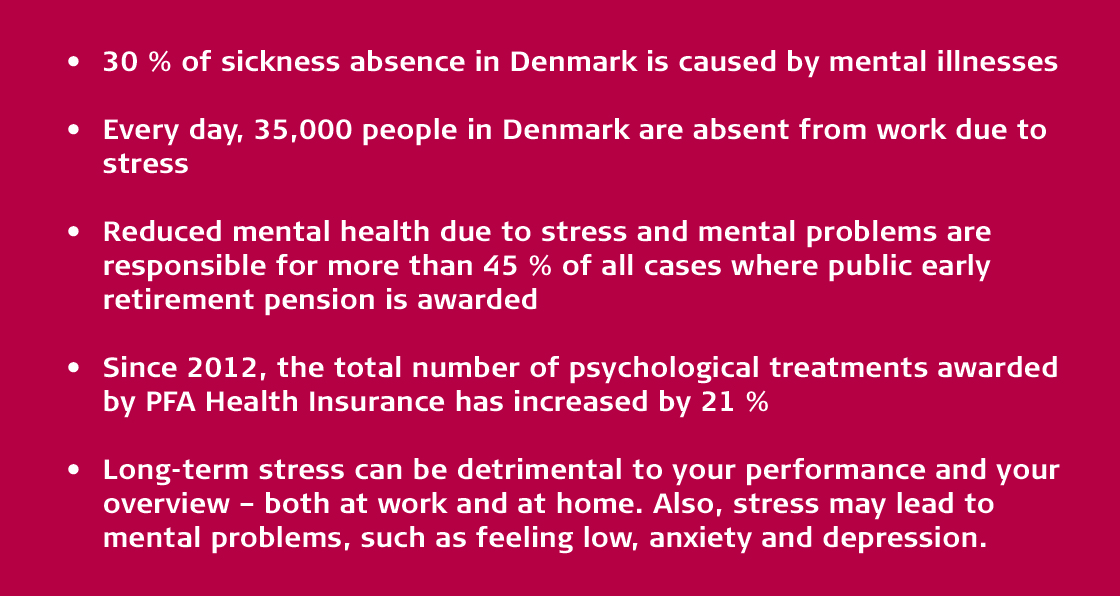Five mental tools that will help you chase away stress

Have you suffered from stress, or do you know anybody who has? Then you are not alone. Each day, 35,000 people in Denmark feel so stressed that they call in sick. Since 2012, PFA has recorded an increase of 21 % in the number of awards that concern psychological treatment. Fortunately, you can still do your bit towards chasing the stress away. Read on and get some good tips from Rikke Bay Haaber, who is heading the health services department at PFA Pension, and Chris Norre, mindfulness expert.
Today’s labour market is, in some areas, more demanding than earlier. The individual tasks are very diverse, and when it comes to overview and efficiency the demands are higher now than 10 years ago – no matter if you have a desk job behind a computer all day, perform chemical tests and procedures or work at the assembly line. This may lead to frustration and stress in your everyday life, however, with the correct mental tools you can chase away the stress and prevent it from taking control of your life. At the end of this article, you find five useful tips to prevent stress.
“More and more people experience increasing performance pressure in their workplace. The feeling of pressure and stress is related to the labour market in general and the time we live in: on one hand, a knowledge-based society with a working culture according to which everything must be done faster and with higher complexity, on the other hand, we must find time and energy for our personal lives as well. Many employers expect the employees to be flexible, prepared for change and always focused and alert. For some, this makes it harder to distinguish between work and leisure time. This may lead to increasing stress levels and mental pressure in many companies,” says Rikke Bay Haaber, who is head of Strategic Health & Prevention at PFA.
She adds that you must not confuse stress with a heavy workload, which is unavoidable and often even a healthy element of a good and interesting job. If you get the opportunity to pull the plug once in a while in between the busy periods, a heavy workload is generally not a problem.
Perfection reigns – at home and at work
You not only need to stay increasingly alert and focused at work compared to earlier. After hours, you need to be the next-to-perfect parent and, at the same time, spend time and energy on leisure activities and friends. Managing everything all at the same time is difficult, and it may give you a feeling of inadequacy, even if you drive yourself to the limit at work as well as at home. If this continues for quite a lengthy period of time, the pressure you experience can develop into actual stress. Each day, about 35,000 people in Denmark feel so stressed that they call in sick.
“Specifically, stress is an imbalance between the demands that you face and the resources you have. The reaction – the stress – is what you experience in a situation which demands – or feels like it demands - more than you can handle. Stress can lead to health problems such as high blood pressure, indigestion and worsening of illnesses you already suffer from,” Rikke Bay Haaber says.
PFA Health Insurance collects data from approximately 180,000 PFA customers. In 2014, just about one in four (24 %) of the awarded psychologically-related treatments went to stress treatments, and among the customers who were awarded treatment of work-related mental disorders as much as 66 % were stress-related. The figures represent awards of psychological counselling in particular.
Anyone may be struck by stress
Like a number of other companies, PFA works with Chris Norre who works as a mindfulness coach with focus on mental health and robustness. He has no doubts that stress is a condition which affects an increasing number of people. He emphasises that it is important to deal with your mental health by focusing ahead, learning to say no and listening to your body’s signals if you want to keep clear of stress.
“Today, stress is a common disorder. You may experience a crisis in your family or at work that triggers a mental breakdown and stress – regardless of your mental strength. There is no coherence at all. One of the most important elements when it comes to preventing stress is to take good care of yourself and acknowledge the pressure you are able to stand. It is important to balance your resources and the demands you face,” Chris Norre says.
Stress is (also) a mental state
He adds that stress is a product of considerable busyness but also of your own expectations and those of your surroundings. Stress and the mental symptoms of stress, such as irritability, memory problems, feeling low and exhaustion, are actually your body trying to tell you that something is wrong. It is a natural reaction that you cannot control once it has started.
"Stress is a mental state that is often caused by a feeling of inadequacy when it comes to measuring up to the surrounding society's demands and expectations of how much you should be able to contribute. Negative stress is your body’s own alarm indicator telling you to slow down when life gets too busy. The typical signs of stress are losing track of things, sleeping problems, digestive problems and a head full of thoughts even when you are trying to relax,” the mindfulness experts adds.
How to steer clear of stress
There are a number of measures you can take to steer clear of stress in your everyday life. Below Chris Norre and PFA's health team list five cornerstones of strong mental health that are good for fighting stress.
Stress is a mental state that is often caused by a feeling of inadequacy when it comes to measuring up to the surrounding society's demands and expectations of how much you should be able to contribute. Negative stress is your body’s own alarm indicator telling you to slow down when life gets too busy
1) Pull the plug: Your ability to cope with work pressure depends on your mental ability to relax when you are off-duty. Scientific evidence shows that mindfulness and relaxation are efficient preventive measures that boost your mind and immune system. One of the simplest mindful tips is to breathe deep down into your lungs for a few minutes to make contact with your body. A coffee break at work is all you need.
2) Focus on your successes: Make a habit of saying “never mind” when you miss a deadline or things don’t work out the way you intended. It is not a question of being indifferent, but you need to accept that it is part of the human nature to make mistakes every now and then. You should not worry about minor errors or mistakes that are quickly forgotten. Instead, you ought to focus on the great experiences at work, at home, among friends as well as family.
3) Get your thoughts under control: Avoid letting negative thoughts fill your head and instead concentrate on what you are actually doing in the moment. At work as well as together with your family and friends. At work, it is important to structure your time, plan the work assignments and prioritise them according to relevance together with your superior and your colleagues. In this way, you address a potential problem before it turns into a crisis, and, at the same time, you build a bridge between the demands at work and your available time. Also, exercise is an excellent way to take a break from the daily grind, and people who exercise do tend to suffer less from stress.
4) Be happy: No need to go to extremes. However, a general positive attitude towards the things you face during your day will make a difference. Moreover, it helps to challenge the negative thoughts – is it really that bad? Nurse yourself and make sure you find some activities that make you happy. Laughter is a vacation from stress; when you laugh, you produce hormones which neutralise stress hormones. In addition, humour helps draw people closer together.
5) Express your feelings: Self-understanding is important; get used to observing how you feel. Whether happy or sad. Learn to express how you are feeling – to your colleagues at the workplace, your friends and family. When you do so, you get used to reaching out for help when you need it.

Sources: The National Research Centre for the Working Environment, the Ministry of Employment, the Danish Appeals Board, PFA and Mr. Chris Norre, mindfulness expert.